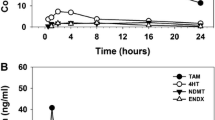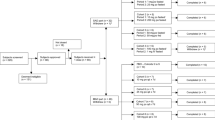Summary
Background
We have synthesized a cyclic nonapeptide (AFPep) that is effective, after being administered by parenteral routes, for the treatment or the prevention of breast cancer. To test the hypothesis that AFPep remains safe and efficacious after oral administration, three different whole-animal bioassays were utilized, and the mechanism by which AFPep functions was investigated.
Methods
Using a human breast cancer xenograft model in mice for therapeutic activity, a carcinogen-induced breast cancer model in rats for prevention efficacy, and a mouse uterus growth inhibition model of anti-estrogenic activity, AFPep was administered by oral gavage (p.o.) and its effects compared to those following intraperitoneal (i.p.) and subcutaneous (s.c.) administration. Toxicity studies evaluated body weights and organ weights in mice and rats receiving AFPep. Preliminary mechanistic studies were carried out in T47D human breast cancer cells growing in culture and evaluated the effect of AFPep on estrogen-stimulated cell growth, phosphorylation of the estrogen receptor (ER), and on level of ER-related kinases.
Results
Orally administered AFPep stopped the growth of human tumor xenografts in mice, decreased the incidence and multiplicity of breast cancers in carcinogen-exposed rats, and inhibited the estrogen-stimulated growth of mouse uteri. In each of these systems, orally administered AFPep produced an effect similar to that obtained for AFPep administered by either i.p or s.c. routes. In rodents, no evidence of toxicity was seen for the peptide, even at very high doses. In culture, AFPep inhibited the estrogen-stimulated growth, but not the basal growth, of T47D cells, and it inhibited the estrogen-stimulated phosphorylation of Serine 118 in the ER of these cells, which was not explainable by early changes in ER-related kinases.
Conclusions
Chronic oral administration of AFPep appears to be safe and effective for the treatment or prevention of breast cancer in animal models.
Similar content being viewed by others
Abbreviations
- AFP:
-
alpha-fetoprotein
- AFPep:
-
synthetic peptide and active site analog of AFP
- DMEM:
-
Dulbecco’s minimal essential medium
- ER:
-
estrogen receptor alpha
- E2 :
-
17β-estradiol
- HPLC:
-
high pressure liquid chromatography
- i.p.:
-
intraperitoneal administration
- MNU:
-
N-methyl-N-nitrosourea
- p.o.:
-
oral administration
- s.c.:
-
subcutaneous administration
- SCID:
-
severe combined immunodeficient mice
- SDS PAGE:
-
sodium dodecyl sulfate polyacrylamide gel electrophoresis
References
Bennett JA, Mesfin FB, Andersen TT, Gierthy JF, Jacobson HI, A peptide derived from alpha-fetoprotein prevents the growth of estrogen-dependent human breast cancers sensitive and resistant to tamoxifen Proc Natl Acad Sci USA 99:2211–2215, 2002
Mesfin FB, Andersen TT, Jacobson HI, Zhu S, Bennett JA, Development of a synthetic cyclized peptide derived from alpha-fetoprotein that prevents the growth of human breast cancer J Pept Res 58:246–256, 2001
Parikh RR, Gildener-Leapman N, Narendran A, Lin H-Y, Lemanski N, Bennett JA, Jacobson HI, Andersen TT: Prevention of MNU-induced breast cancer by AFPep, a peptide derived from the active site of alpha-fetoprotein Clin Canc Res 11: 8512–8520, 2005
Pauletti GM, Gangwar S, Siahaan TJ, Aube J, Borchardt RT, Improvement of oral peptide bioavailability: Peptidomimetics and prodrug strategies Adv Drug Deliv Rev 27: 235–256, 1997
DeFreest LA, Mesfin FB, Joseph L, McLeod DJ, Stallmer A, Reddy S, Balulad SS, Jacobson HI, Andersen TT, Bennett JA, Synthetic peptide derived from alpha-fetoprotein inhibits growth of human breast cancer: investigation of the pharmacophore and synthesis optimization J Pept Res 63:409–419, 2004
Kates SA, Sole NA, Beyermann M, Barany G, Albericio F, Optimized preparation of deca(L-alanyl)-L-valinamide by 9-fluorenylmethyloxycarbonyl (Fmoc) solid-phase synthesis on polyethylene glycol-polystyrene (PEG-PS) graft supports, with 1,8-diazobicyclo [5.4.0]-undec-7-ene (DBU) deprotection Pept Res 9:106–113, 1996
Kates SA, Daniels SB, Albericio F, Automated allyl cleavage for continuous-flow synthesis of cyclic and branched peptides Anal Biochem 212:303–310, 1993
Bennett JA, Zhu S, Pagano-Mirarchi A, Kellom TA, Jacobson HI: Alpha-fetoprotein derived from a human hepatoma prevents growth of estrogen-dependent human breast cancer xenografts. Clin Cancer Res 4:2877–2884, 1998
Grubbs CJ, Hill DL, McDonough KC, Peckham JC, N-nitroso-N-methylurea-induced mammary carcinogenesis: effect of pregnancy on preneoplastic cells J Natl Cancer Inst 71:625–628,1983
Grubbs CJ, Juliana MM, Hill DL, Whitaker LM, Suppression by pregnancy of chemically induced preneoplastic cells of the rat mammary gland Anticancer Res 6: 1395–1400, 1986
Tang HY, Lin HY, Zhang S, Davis FB, Davis PJ, Thyroid hormone causes mitogen-activated protein kinase-dependent phosphorylation of the nuclear estrogen receptor Endocrinology 145:3265–3272, 2004
Bennett JA, Semeniuk DJ, Jacobson HI, Murgita RA, Similarity between natural and recombinant human alpha-fetoprotein as inhibitors of estrogen-dependent breast cancer growth Breast Cancer Res Treat 45:169–179, 1997
Wang W, Borchardt RT, Wang B, Orally active peptidomimetic RGD analogs that are glycoprotein IIb/IIIa antagonists Curr Med Chem 7:437–453, 2000
Crandall BF, Alpha-fetoprotein: A review Crit Rev Clin Lab Sci 15: 127–185, 1981
Murgita RA, Tomasi TB Jr, Suppression of the immune response by alpha-fetooprtoetin on the primary and secondary antibody response J Exp Med 141: 269–286, 1975
Chaabner BA, Ryan DP, Paz-Ares L, Garcia-Carbonero R, Calabresi P, Antineoplastic agents In: Hardman JG, Lumbird LE, Goodnam-Gilman A, (eds) The Pharmacological Basis of Therapeutics McGraw Hill NY 2001 pp 1389–1459
Goetz MP, Erlichman C, Loprinzi CL, Pharmacology of endocrine manipulations In: DeVita VT, Hellman S, Rosenberg AS, (eds.) Cancer. Principles and Practice of Oncology Lipincott Williams & Wilkins NY 2005 pp. 457–470
Lannigan DA, Estrogen receptor phosphorylation Steroids68:1–9, 2003
Kato S, Endoh H, Masuhiro Y, Kitamoto T, Uchiyama S, Sasaki H, Masushige S, Gotoh Y, Nishida E, Kawashima H, Metzger D, Chambon P, Activation of the estrogen receptor through phosphorylation by mitogen-activated protein kinase Science 270: 1491–1494, 1995
Acknowledgements
This work was supported by the NIH (R01 CA102540), the Department of Defense (DAMD17–02–1–0269) and the Susan B. Komen Foundation (DISS-0201775).
Author information
Authors and Affiliations
Corresponding author
Rights and permissions
About this article
Cite this article
Bennett, J.A., DeFreest, L., Anaka, I. et al. AFPep: an anti-breast cancer peptide that is orally active. Breast Cancer Res Treat 98, 133–141 (2006). https://doi.org/10.1007/s10549-005-9140-5
Received:
Accepted:
Published:
Issue Date:
DOI: https://doi.org/10.1007/s10549-005-9140-5




